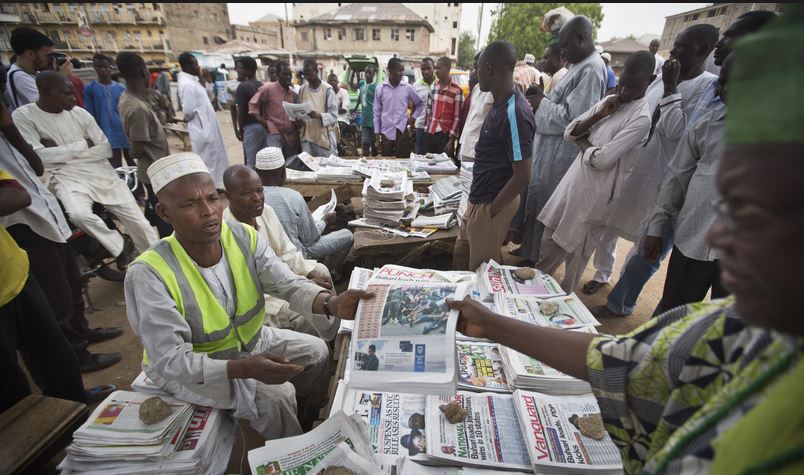The loss of over $3 billion to illegal gold mining and the billions of Nigeria spent on the nation’s ailing refineries in April are some of the leading stories in Nigerian newspapers on Friday.
The Guardian reports that President Muhammadu Buhari, yesterday, decried the activities of the smugglers, leading to a revenue loss of $3 billion between 2012 and 2018.
He, however, said his administration was up and doing to redress the situation.
Speaking at the official presentation of locally mined gold bars by the Presidential Artisanal Gold Mining Development Initiative (PAGMDI) in Abuja, Buhari reaffirmed government’s commitment to establishing gold refineries in the country.
According to him, improved mining would generate no fewer than 250,000 jobs and over $500 million yearly in royalties and taxes.
ThisDay says that despite not processing petroleum products for years, the federal government has continued to spend hugely on the nation’s three petroleum refineries.
The NNPC, in a full report of its operations for April 2020, said that all the refineries were still down, but N10.47 billion was spent in the month under review, further doubling down on the losses incurred as a result of the non-functioning national assets located in Warri, Port Harcourt and Kaduna.
Nigeria’s Minister of State, Petroleum, Mr. Timipre Sylva, had last weekend decried the huge losses incurred in running the comatose refineries, which he ascribed to the operation of the national oil company as a mostly publicly-owned entity.
“We have a situation now of a refinery that has not functioned for three years, yet it’s paying salaries. Every staff is being paid. We have carried on paying salaries. Nobody can sack anybody. “People are getting promoted, but the refineries are not functioning. Unions will not let you. Those are the real issues,” he said.
The Punch reports that the Nigerian Government on Thursday inaugurated a campaign strategy team for Dr. Ngozi Okonjo-Iweala as she contests for the position of Director-General of the World Trade Organisation.
The Minister of Industry, Trade and Investment, Richard Adebayo, inaugurated the team in Abuja and said the creation of a campaign strategy group was vital in ensuring that the Nigerian candidate emerged as the DG of the WTO.
The minister disclosed this in a statement issued in Abuja by his ministry’s Assistant Director of Information, Oluwakemi Ogunmakinwa.
The statement was titled “Adebayo inaugurates campaign strategy team for Dr Ngozi Okonjo-Iweala’s post for DG WTO.” Adebayo said the decision of the President, Major General Muhammadu Buhari (retd.), to nominate Okonjo-Iweala as Nigeria’s candidate for the position was taken in good faith.
The newspaper says that the country’s foreign reserves fell by $454.05m from $36.57bn on June 1 to $36.12bn on July 15, the latest figures from the Central Bank of Nigeria showed on Thursday.
The CBN, in its February monthly report, entitled ‘Gross external reserves,’ said the reserves stood at $36.6bn at the end of February 2020, indicating a decline of 0.4 per cent from $36.73bn at the end of January 2020.
It said that the decline was due mainly to foreign exchange market interventions and direct payments.
According to the CBN, the external reserves position can finance four months of imports of goods and services, or 6.4 months of goods only, using the import figure for the fourth quarter of 2019.
The Nation newspaper says that the Nigeria Deposit Insurance Corporation (NDIC) yesterday proposed stiff penalties for negligent directors of failed banks.
It said this will serve as a deterrent to officers and directors of banks, and ensure that the banking industry ensures compliance with laws and regulation.
The corporation also proposed the express prohibition of insider loans/criminalising insider loans by making it an offence punishable with imprisonment and fine for directors of licensed banks to obtain credit facilities from their own banks, whether such credit facilities are secured or not.
It observed that there is a need to make clearer the legal frameworks and clarification of roles of the NDIC and the Central Bank of Nigeria (CBN), even as they carry out their supervisory mandates.
The NDIC Managing Director/CEO, Umaru Ibrahim, spoke during the Public Hearing for the Amendment of the BOFIA Act 2004 towards the Repeal and Re-enactment of the Bill to BOFIA 2020 organised by the Senate Committee on Banking, Insurance and Other Financial Institutions at the National Assembly in Abuja.
GIK/APA


